- Home
- Elizabeth Goudge
Gentian Hill Page 3
Gentian Hill Read online
Page 3
Reveling in this blessed sense of safety, he did not go away when the other men did, but stayed where he was just inside the doorway, his eyes shut, his beads still slipping through his lingers. "Holy Mary, Mother of God, pray for us sinners now and at the hour of our death." The mechanical repetition of the words soothed him, but he was hardly conscious of saying them. The words that he heard seemed to be spoken by the chapel itself, by the rock floor, the stout walls, and the stone roof. "The Lord is my fortress, my rock, and my defence." Each stone cried out in triumph, but the triumph had a biting edge, as though the words were cutting into his spirit, so that gradually, as the triumph continued, the pain of his bruised and aching body seemed mysteriously transferred to his soul. What had he done? The question repeated itself, mingling with the voices of the stones, until he faced it. Deserted. Run away. Found refuge in flight instead of in- what? Some impregnable fortress that existed as the core of quiet at the center of whatever whirlwind of fear or pain. His lips moved, the beads slipped through his fingers, and his face was still, but there was a sudden turmoil of defiant shouting in his soul that tried to shout down the mounting accusation of the voices of the silent stones. "I couldn’t do it, I tell you. It was not possible. Flesh and blood could not endure it. I tell you I could not do it."
But the stones were not silenced, and suddenly the chapel was no longer a place of refuge, but the thing that he dreaded most of all, a prison. The walls were closing in on him, coming nearer and nearer. They’d get him in another minute, hold him in their hands of stone, take him prisoner forever. He must get out! Get out! He opened his eyes and scrambled to his feet, and then for the first time realized that he was not, as he had thought, alone in the chapel. A white-haired, white-faced man in black was kneeling in prayer before the place where the altar must once have been. He must have been there all the while, but Zachary, coming in behind the other seamen, had not seen him. He stood still, breathing fast, his queer panic increased by the sight of that still figure. Then the man turned his head and looked at him. It was a look of infinite kindness, but Zachary in his panic did not see the kindness, only the almost stonelike whiteness. of the face. It was as though the chapel itself had taken human shape, with hands that would hold him and keep him here. The power of movement returned suddenly to his legs, and he bolted out of the door and around the corner, keeping close to the outer wall, for if he detached himself from that for a moment, the eyes of the ships would see him. At the landward side of the chapel, where its bulk stood between him and the sea, he leaned against the wall, away from the windows so that the man inside could not see him. He stood there with his limbs shaking and the sweat streaming off him until the normal worldly outlook upon things, which he was accustomed to call sanity, slowly returned to him again.
"Fool!" he said to himself. "Crazy fool! Feverish and crazy. You got away from that damn ship only just in time. Get inland and find that farm. Right inland. It will be safe there."
He let himself down to the gravel and rested for a little, his eyes upon the colored lovely distance of the folded hills. It was warm here in the sun, and strength came back. Presently he got up and began to climb down the rock.
CHAPTER II
1
Then she was grown up, Stella smiled sometimes when she heard people speculating as to what was their first memory, and seldom able to identify it with certainty. She was in no doubt about her First memory, nor her second, and she knew they had come into her y possession on the same day, September the 22nd, 1796, when she was two years old. They were strongly contrasted, and perhaps that was why they had affected her so deeply. The first, though mercifully vague, was nonetheless dreadful in its terror, and visited her again and again through her child- hood, in nightmare or fever, a memory of noise, fire, the grasp of thin arms round her that hurt with the agonizing tightness of their grip, then the blackness of water closing over her head. The second was merciful and beneficent, deep silence, starlight shed upon a quiet garden, air that was light and cool upon scorched skin, and then the arms of Mother Sprigg about her, not hard and tight like those other arms, but steady and comfortable like Mother Sprigg herself.
"Am I your own girl, Mother?" she asked suddenly when she was ten years old. They were sitting together before the kitchen fire, alone except for the cat, Seraphine, asleep in her basket with her kittens disposed around her. The candles were lighted and the fire burned brightly, for though it was only the beginning of September the evening was chilly, and Stella was sewing her sampler while Mother Sprigg stitched at her patchwork quilt. It was a fine evening and they had not pulled the curtains. Outside the sunset spread a sheet of pure gold behind the beautiful motionless shapes of the old orchard trees, and there was no sound except the whisper of the flames on the hearth, the ticking of the grandfather clock, and the soft click of Mother Sprigg’s flying needle against her thimble. Stella’s needle did not fly and so it did not click. It went slowly and laboriously in and out of her sampler, pursuing painfully the bloodstained path of duty, and now and then ceasing work altogether while Stella sucked her finger, and then sprang yet another question upon poor Mother Sprigg.
"Bless the child!" she cried now, and dropped the quilt on her lap. Generally she managed to go on stitching while grappling with Stella’s thirst for information, though at times her rosy face puckered with the distress of the intellectual effort, but this question brought her to such a complete full stop in household activity that Stella gazed at her in round- eyed astonishment. Had she said anything wrong? She stretched out a slim brown hand, the beads of blood on the pricked finger sparkling in the candlelight like tiny rubies, and laid it on the world hardened, fat red hands clasped in Mother Sprigg’s lap. "Mother?" she queried tentatively.
Mother Sprigg gave her head the sudden, accomplished jerk which shook her spectacles (required for close work only) from the bridge of her short button nose to a little lower down, and gazed over the top of them at the child on the stool beside her.
"What makes you ask, love?" she whispered. Yet even while she asked, she knew. The child was old enough now to notice the contrasts; the graceful hand lying on her own clumsy one was only one of many.
"I remember that I came from somewhere else to here," said Stella. "It was quite different?
"What do you remember, child?" asked Mother Sprigg.
"Noise, a fire, and black water, and arms that hurt," said Stella in quick whisper, as though anxious to get it over, and then slowly and with great sweetness she said, “And after that, Mother, it was quiet in the garden, and your arms were comfortable."
All her life Stella would never be exuberant with her thanks. She would just say what it was that had been done for her, and leave it at that, but the fact that she knew exactly what it was would give to her plain statement of fact a remembered value far outweighing all the muddled emotionalism in the world. Quiet and comfort. In years to come, Mother Sprigg would recall that she had given those to the child Stella, and would feel again the touch of the slim hand on hers, and remember that there had been more true affection in it than in the hugs and kisses of a more exuberant child. She would know then that she had given Stella, and, had called forth in the child, things of worth, and would be glad.
And now her momentary distress passed suddenly in the knowledge that, if this question had to come, it had come in a good hour. They were alone and quiet, with the child old enough to be told the truth, yet not old enough, she thought, to feel distress that only experience of suffering can quicken.
"No, you are not my own girl," she said. "Though the Lord knows you are as dear to me as though you were. Nearly eight years ago, love, you were brought here, a little thing two years old. Sitting here before the fire I was, like I am now, patching a shirt, and feeling a bit anxious because Father was not back from Plymouth. ‘Back at eight o’clock
on Wednesday, Martha,’ he’d said to me, but the grandfather had struck ten and still I sat there stitching. It was a still night and the s
trokes of the clock had fallen loud and heavy,
like a bell tolling. I was jumpy, I don’t say I wasn’t. There was an invasion scare that year, and every day we were expecting a landing of the French, and every day the troopships were going off from Plymouth with men and guns for Ireland, for they didn’t know where that black-hearted scoundrel Bony would strike, there or here. It was to see Bill, his soldier brother, set sail on the frigate Amphion that your father had ridden to Plymouth. There was to be a grand farewell party on board and your father had ridden off on the Tuesday before it was light, all in a taking because he’d overslept himself and he feared he’d be too late for the grand doings, and too late he was-by the mercy of God."
"Why, what happened?" asked Stella.
"The Amphion blew up, love, with the wives and sweethearts and little children of the men all on board. They say a light was dropped by a gunner who was stealing ammunition. A terrible thing it was. Three hundred men and women and children lost their lives, your father’s brother among ’em. Your father, riding through Plymouth, heard the explosion, and when he reached the Hoe they were taking the bodies
from the water. Your father, he did what he could, and worked as hard as any. One poor young woman whom he helped to take from the water he never forgot. He said she
was beautiful, even in death. A sailor had held her up and kept her from drowning, but she’d died while he held her shock, maybe, or some injury-I don’t know. She wore a green gown and there was a gold locket ’round her neck, and her arms were locked tight ’round the body of her child.’
"Me?" whispered Stella.
"Yes. Your father, when he saw you, lost his head. You see, love, we’d had a little girl who’d died at just about the age you were then, the only child we ever had, and your father had grieved over the loss, and couldn’t seem to get over it. When he saw you there, and a couple of rough chaps unclasping your dead mother’s arms from about you, he just
snatched you away from them and picked you up in his own arms. One of the men said, ‘The child’s dead,’ but though you were wet and cold like a little fish, he knew you were
alive. He was in such a taking he didn’t answer the man, he just made off with you, without a with-your-leave or a by-your-leave. There was an inn nearby, and he took you there and had the good woman look after you, while he went back to help with the rescue work and see what had become of his brother. He was not among the saved, was poor Bill. And the next day, you being as fit as a fiddle by that time, and no one seeming to know a thing about you, he wrapped you up in his cloak and rode off home with you, and you were good as gold all the way, and never cried."
Stella laughed suddenly, her clear, happy laugh that was a delight to all who heard it. Mother Sprigg decided that it was as she had hoped, though the child was tender-hearted and sensitive, she was too young as yet to realize the tragedy of the story.
"Weren’t you startled, Mother, to have Father ride home with me like that?"
"You could have knocked me down with a feather," declared Mother Sprigg, gaiety springing up in her to answer the laughter of the child. "I heard Bess trotting in the lane, and I ran out of the house and down through the garden to the gate. ‘Here you are, Mother,’ says Father, and he leans down and dumps you in my arms. You’d been asleep but you woke up then and looked about you, at the garden and up in my face, and then you cuddled down comfortable and went to sleep again. The next morning you were up with the birds and behaving as though you had lived at Weekaborough Farm from the day you were born."
“And no one ever tried to take me away from you?" asked Stella.
"No, love. Of course I sent your father back to Plymouth at once to make more enquiries, for it was nothing but baby stealing, the way he’d walked off with you, but he couldn’t find that you’d any relatives. No one seemed to know who your poor mother was. There was nothing in her pocket but an embroidered handkerchief and your little coral, and nothing in her locket but a curl of dark hair and a scrap of paper with something written on it in a foreign language that no one could make head or tail of. Your father saw her buried decently, and then he put the handkerchief and the coral and the locket in his pocket, and rode off home as fast as he could to tell me you were ours for keeps, our own girl Stella."
The child was sitting now with her pointed chin cupped in her slim hands, staring at the fire. She spoke no word of pity for her real mother; it seemed that just now it was the woman beside her with whom her thoughts were busy.
"Mother, was your little girl who died called Stella?"
"No, love, she was called Eliza, after my own mother. But your father, being clean besotted about you, must needs choose some fanciful name for you. Star-bright eyes you had, he said, when you first looked up at him, and the starlight was bright on your face when I looked at you that first time, so Stella it had to be, though the name don’t go well with Sprigg, to my way of thinking. ‘But what matter? said your father. ‘The maid will be changing my name for another as soon as she’s husband-high, and meanwhile she’s my Stella and my sprig of mischief, born on the first of June with
candles in her eyes.’ "
"And why should I have candles in my eyes because I was born on the first of June? And how do you know that I was born on the first of June?" demanded Stella. She had an accurate as well as an imaginative mind. She delighted in the fantastic, provided it was based upon a fairly reasonable hypothesis, like a pretty flower with solid roots in the earth, but she did not like it just fluttering down from nowhere.
"There’s no knowing what day you were born, love, but you seemed just over two years when you came to us, and the first of June, 1794, was the Glorious First, when the fleet sailed into Plymouth Sound with six captive French battleships, and in each house a lighted candle was set in every pane. All night they burned, pretty as a picture. Your father saw the sight, and he never forgot it. Like all the stars fallen down from heaven, he said it was, till the dawn came and put them out."
“ ‘Night’s candles are burnt out, and jocund day stands tiptoe on the misty mountain tops,’ " said Stella in a voice that suddenly became curiously deep and mature for a child.
"Eh?" asked Mother Sprigg with sudden sharpness. "Have you been reading some old book again?"
There were few things that made Mother Sprigg angry, but one was to have Stella browse among Doctor Crane’s old books. The doctor was the best friend they had, and he had taken upon himself the business of Stella’s education, but he and Mother Sprigg differed a good deal as to what was, and what was not, education. Reading, writing, and elementary arithmetic were all the child needed to learn of the doctor, Mother Sprigg maintained. This, combined with the arts of housewifery that she herself could teach her, was all the education required by a farmer’s daughter. Doctor Crane disagreed; the education required by any individual, he maintained, was just exactly all the knowledge the individual could possibly assimilate. Stella agreed with him, and let loose among his books, she assimilated at a good pace, keeping her knowledge hidden from Mother Sprigg as much as she could. Yet Mother Sprigg always knew when she had been reading the doctor’s books, because quite unconsciously she would quote little scraps from them in that startlingly unchildish voice. Then Mother Sprigg would scold. She didn’t know why she scolded, unless it was because Stella’s thirst for knowledge seemed to hold some sort of unexplainable threat that frightened her, and she always scolded when she was afraid.
Stella, her chin still cupped in her hands, did not answer. She was always silent then scolded, but there was no sullenness in her silence, merely a smooth shining determination to go her own way, from which scoldings slithered to oblivion
like water off a duck’s back, accomplishing nothing whatever. Mother Sprigg sighed in irritated frustration, then laughed as Stella lifted her face from her hands, hitched her stool nearer, and looked up at her adopted mother with the countenance of a merry elf, the laughter running over her face like light, and both her dimples showing. And
that, too,
was typical of Stella. Her own way once insisted upon and secured, she was swift to dispel any smallest hint of unpleasantness, and Stella sweeping away unpleasantness was like the sun bursting out through the clouds; one could not greet it with anything but forgetfulness and a lightening of the heart.
The sudden intrusion of Doctor Crane into the real business of the evening was now as though it had never been, and Stella’s laughter vanished too, even as her previous queer maturity had vanished. She was just a loving, serious little girl as she laid her hand on Mother Sprigg’s knee and said gently, "You are my Mother." Then it seemed that she put from her also the story she had asked for, for she smoothed her skirts, looked at her pricked finger, sighed, sucked it, then replaced her thimble and began once more to sew her sampler. Mother Sprigg too picked up her quilt, adjusted her spectacles, and chose a hexagon of crimson velvet with a sigh of relief. It was over, the question and the explanation she had been dreading for so long, and it had all passed off very well indeed. But what an unaccountable little soul she was, this beloved Stella. Mother Sprigg did not quite know how she had expected the child to take the story she had had to tell, but somehow not as calmly and quietly as this.

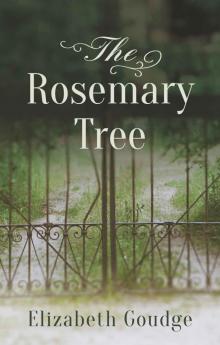 The Rosemary Tree
The Rosemary Tree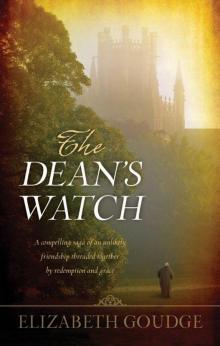 The Dean's Watch
The Dean's Watch Linnets and Valerians
Linnets and Valerians Gentian Hill
Gentian Hill B00DRI1ZYC EBOK
B00DRI1ZYC EBOK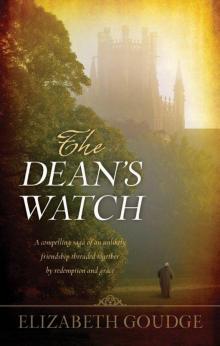 B008O6ZWTG EBOK
B008O6ZWTG EBOK The Scent of Water
The Scent of Water Pilgtim's Inn
Pilgtim's Inn Island Magic
Island Magic Pilgrim's Inn
Pilgrim's Inn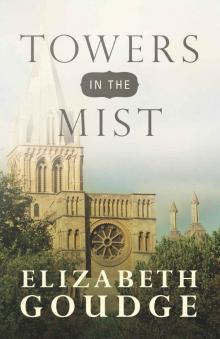 Towers in the Mist
Towers in the Mist Green Dolphin Street
Green Dolphin Street The Bird in the Tree
The Bird in the Tree The Child From the Sea
The Child From the Sea My God and My All: The Life of Saint Francis of Assisi
My God and My All: The Life of Saint Francis of Assisi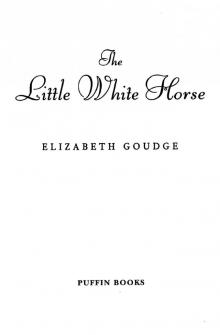 The Little White Horse
The Little White Horse My God and My All
My God and My All B00CKXCNH8 EBOK
B00CKXCNH8 EBOK